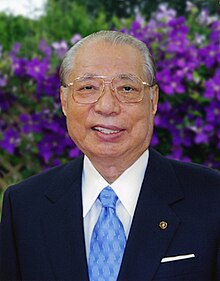This article is an autobiography or has been extensively edited by the subject or by someone connected to the subject. (March 2024) |
Daisaku Ikeda | |
|---|---|
 Ikeda in 2010 | |
| Former President of Soka Gakkai International | |
| In office 26 January 1975 – 15 November 2023 | |
| Former Honorary President of Soka Gakkai | |
| In office 24 April 1979 – 15 November 2023 | |
| 3rd President of Soka Gakkai | |
| In office 3 May 1960 – 24 April 1979 | |
| Preceded by | Jōsei Toda Tsunesaburō Makiguchi |
| Succeeded by | Hiroshi Hōjō (北条浩) Einosuke Akiya Minoru Harada |
| Personal details | |
| Born | 2 January 1928 Ōta, Tokyo, Japan |
| Died | 15 November 2023 (aged 95) Shinjuku, Tokyo, Japan |
| Spouse | Kaneko Ikeda (池田香峯子) |
| Children | 3 (1 deceased) |
| Parents |
|
| Residence(s) | Japan, Tokyo, Shinjuku-Ku, Shinanomachi (信濃町) |
| Alma mater | Fuji Junior College (present-day Tokyo Fuji University)[1] |
| Website | daisakuikeda |
Daisaku Ikeda (池田 大作, Ikeda Daisaku, 2 January 1928 – 15 November 2023) was a Japanese Buddhist leader, author, philosopher, and educator. He served as the third president and then honorary president of the Soka Gakkai, the largest of Japan's new religious movements.[2]: 5
Ikeda was the founding president of the Soka Gakkai International, which claims to have approximately 11 million practitioners in 192 countries and territories,[3] more than 1.5 million of whom reside outside of Japan as of 2012.[4] Although these numbers are difficult to verify due to varying levels of participation, recent research and surveys estimate that approximately two to three percent of the Japanese population (ranging from 2.5 million to 4 million people) are active members of Soka Gakkai.[5]
Ikeda was the founder of a variety of educational and cultural institutions including Soka University, Soka University of America, Min-On Concert Association and Tokyo Fuji Art Museum.[6] In Japan, he was also known for his international outreach to China.[7]
Ikeda has been described as a "controversial figure" over several decades from the 1970s in Japan and other countries due to the ambivalent reputation of the Soka Gakkai — whose name has been linked to various political and financial scandals, cult of personality accusations, and his relation to the political party Kōmeitō, which he founded. He has been the subject of numerous articles, questions and accusations in Japanese and international media.[8]: 43 [9]: 147 [10]: 149 At his death, scholars and journalists described Ikeda as among the most polarizing and important figures in modern Japanese religion and politics.[11]
- ^ "Daisaku Ikeda Profile". Soka University. Archived from the original on 23 October 2012. Retrieved 22 February 2013.
- ^ Métraux, Daniel A. (2012). Soka Gakkai International: Japanese Buddhism on a Global Scale (DOC). Staunton, Virginia: Virginia Consortium of Asian Studies and the Virginia Review of Asian Studies.
- ^ Clark Strand (Winter 2008). "Faith in Revolution". Tricycle. Retrieved 5 March 2020.
- ^ McLaughlin, Levi (2012). "Soka Gakkai in Japan". In Prohl, Inken; Nelson, John (eds.). Handbook of Contemporary Japanese Religions. Brill. pp. 269–308. ISBN 978-90-04-23436-9.
Today, the group has a self-declared membership of 8.27 million households in Japan and more than 1.5 million adherents in 192 countries abroad under its overseas umbrella organization Soka Gakkai International. Recent scholarship challenges theses figures and points to a figure in the neighborhood of two percent of the Japanese population.
- ^ Levi McLaughlin, Soka Gakkai's Human Revolution: The Rise of a Mimetic Nation in Modern Japan, University of Hawaii Press 2019: "Soka Gakkai has exceeded the capacity of other modern Japanese religious organizations to build institutions and attract adherents. Today, the group claims 8.27 million households in Japan and close to two million adherents in 192 countries under its overseas umbrella organization Soka Gakkai International, or SGI.1 These self-declared figures are exaggerated. Survey data point instead to a figure in the neighborhood of between 2 and 3 percent of the Japanese population, fewer than four million people, who most likely self- identify as committed Gakkai adherents. But even the most conservative estimates allow us to surmise that virtually everyone in Japan is acquainted with a member, related to a member, or is a member of Soka Gakkai." (p.3)
- ^ "University Founder". Soka University. Retrieved 14 May 2024.
- ^ Motoko Rich (29 November 2023). "Daisaku Ikeda, Who Led Influential Japanese Buddhist Group, Dies at 95". The New York Times.
On another front, Mr. Ikeda asked that the party push Japan to recognize the People's Republic of China; the two countries normalized diplomatic relations in 1972. Two years later, Mr. Ikeda met with Zhou Enlai, then the premier of the People's Republic, at a hospital in Beijing, where Mr. Zhou was being treated for cancer.
- ^ Cite error: The named reference
JSR-1999was invoked but never defined (see the help page). - ^ Métraux, Daniel A (1994). The Soka Gakkai Revolution. University Press of America. ISBN 9780819197337.
Ikeda, possibly one of the more controversial figures in Japan's modern history, is the Dr. Jekyll and Mr. Hyde of contemporary Japanese society—how one sees him depends on one's vantage point.
- ^ Cite error: The named reference
Lewis-2005was invoked but never defined (see the help page). - ^ "The Death of Ikeda Daisaku". Substack. 22 November 2023. Retrieved 14 May 2024.